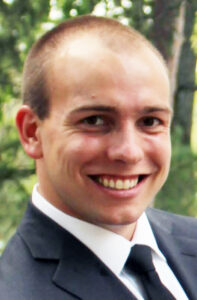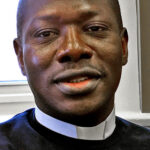By Patrick Schmadeke
Last spring our garden was planted a little too compact. Our interest in maximizing output resulted in a less than ideal harvest. With the beans and tomatoes crowding each other out, very little of what we planted had space to flourish. Bound to learn from our mistake, this year we gave our plants the proper room to grow. Now, we have cherry tomatoes coming out of our ears. The image of a garden is helpful for how we might imagine ministry.

In the widest sense of the term, ministry can happen in any job and in any relationship. Phrases like “treating the whole person” and “person-centered care,” which are common to the medical field, overlap in important ways with ecclesial ministry. Thus, the youth minister and the physical therapist can execute their work with a similar ministerial disposition. Another point of commonality in these and other vocations is that people are so giving of themselves in their desire to treat the whole person that their efforts have a negative side effect.
This is attested to in the growing body of literature on the phenomena of burnout. The use of the term burnout, while rather rare prior to 1970, has skyrocketed in recent decades. A sampling of the abundant titles on the topic reveals their main themes: “Compassion Fatigue: Coping with Secondary Traumatic Stress Disorder in Those who Treat the Traumatized” (1995), “Burnout: The Cost of Caring” (2003), “Banishing Burnout: Six Strategies for Improving Your Relationship with Work” (2005), “Stop Nurse Burnout: What to Do When Working Harder Isn’t Working” (2016), “Burnout: The Secret to Unlocking the Stress Cycle” (2019).
The mountains of research on this topic in recent years highlights the need to make sure our approach to ministry is sustainable in all settings. Bernard of Clairvaux, a 12th century doctor of the church, is a source of clarity on this matter. In his commentary on the Song of Songs, Bernard outlines the operations of the Holy Spirit as it pertains to our ministerial activities and provides imagery compatible with that of a well-planted garden.
First, Bernard contrasts two different approaches to ministry, saying that the wise see “life as more like a reservoir than a canal. The canal simultaneously pours out what it receives; the reservoir retains the water till it is filled; then discharges the overflow without loss to itself.” Rather than constantly rerouting the good that we receive from the Holy Spirit (like a canal), Bernard says we should let the work of the Holy Spirit fill us (like a reservoir), and work this abundance of love and care. “First be filled, and then control the outpouring.” This approach does not restrict the giving of oneself, rather, it ensures sustainable efforts and nourishes “a love…full of zeal.”
Second, Bernard reminds us of our social disposition in ministry, and the shortcomings that we must not succumb to. Our ministry must not be one that “bows to flattery, flinches under fear, is upset by sadness, shriveled by avarice, entangled by ambition, disquieted by suspicions, tormented by insults, exhausted by anxieties, puffed up by honors, consumed by envy.” Indeed, succumbing to vice undercuts the ministerial effort.
Finally, Bernard reminds us that only the love of God can sustain us. “God himself is love, and nothing created can satisfy the man who is made in the image of God, except the God who is love.” Any other desire must be subordinate to the primary desire to experience the love that “can effectively fill the heart’s capacity.”
To not be grounded in this primary desire, Bernard says, is defective to any ministerial effort. From inclinations towards institutional advancement and social prestige, one who “has not yet attained to this love is promoted to office at the gravest risk to himself … even if he knows everything, if he gives all his goods to the poor and lets his body be taken for burning, without charity he is worthless.”
Bernard encourages us to seek a reservoir-state-of-spirit, filled by “the primal fountain of life.” Any effort lacking this is akin to planting a garden too compact. Nothing will be able to flourish.
(Editor’s note: Patrick Schmadeke is a graduate of St. Ambrose University (‘13) and a student in the Master of Divinity program at the University of Notre Dame. His column offers reflections on his coursework, engaging with the richness of the Catholic Tradition and its relevance to the world today.)











